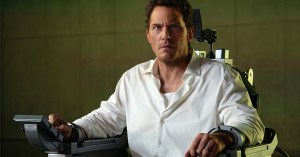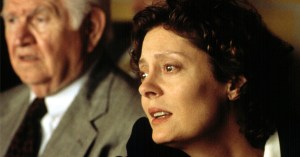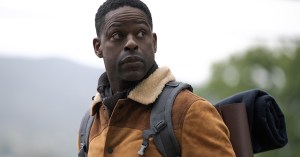Further Reading: Making Waves as Die Welle Arrives
Kim compares and contrasts two versions of the same story.

Kim compares and contrasts two versions of the same story as a German version of the story prepares for UK cinemas.
German writer-director Dennis Gansel’s Die Welle (The Wave), out now, is based on an incident which took place in 1967 at a high school in Palo Alto, California. The story, about a social experiment which got out of hand, has already inspired a long-in-print non-fiction book by Todd Strasser and a 1981 ‘After Hours’ TV special (both called The Wave) directed by Alexander Grasshoff. Gansel’s film owes a lot to the earlier TV show and the book, which in turn are based on a 1972 article (‘The Third Wave’) by teacher Ron Jones (which you can read here; with a little clicking, you can find the 1981 show online too).

The new film can’t help but feel like a follow-up to Oliver Hirschbiegel‘s successful Das Experiment (The Experiment), also based on a Californian social experiment which got out of hand (in the earlier film, test subjects were arbitrarily divided into prisoners and guards and those given positions of authority proceded to misuse it). Given that both real-life stories have been used to theorise about the way ordinary decent people enabled the Third Reich, it’s unsurprising that they retain resonance in contemporary Germany; in this case, Strasser’s book remains a set text in German classrooms and perhaps better known than in America — though, asking around, I found Americans and Brits who’d read it in school too.
Comparing versions, The Wave is dated by the peculiarly over-stressed performances and sunstruck look of US educational TV (not to mention a lot of hairspray), but Die Welle reprises key sequences and lines (‘can I be your bodyguard?’) from the earlier dramatisation. For followers of 1970s and ’80s genre schlock, The Wave also gets a certain frisson from casting Bruce Davison (still growing out of his creepy youth image from Last Summer and Willard) as liberal potential fuhrer Mr Ross, and filling his classroom with the likes of Lori Lethin (Bloody Birthday, Return to Horror High), John Putch (Jaws 3-D) and Jamie Rose (Just Before Dawn) — whereas Die Welle has good German actors we’re not that familiar with even on an I-know-the-face-but-not-the-name basis.

Popular teacher Rainer Wenger (Jürgen Vogel) — taking the Davison role – is introduced singing along to the Ramones’ ‘Rock ‘n’ Roll High School’ as he drives to work. Assigned to teach a week-long special project of autocracy, he can’t get a stuffier colleague to switch with him so he can tackle the more congenial subject of anarchy. His cross-section of kids — some good students, some committed jocks, some slackers, a lot of apathetics and one or two troubled types — are initially unimpressed, and especially bored and alienated by the mention of Nazis. So, rather than explain autocracy, Wenger sets out to demonstrate it.
He insists on orderly behaviour and good posture, institutes formal rules for answering questions, jokingly refers to the anarchist class as ‘our enemies’, hurries through an election for class leader (which he, of course, wins) and suggests everyone adopt a simple uniform (plain white shirt and jeans). He is surprised at how positively the bulk of the pupils (a couple of spiky princesses and a single troublemaker excepted) react to talk of ‘strength through discipline’ and form a movement called ‘the Wave’ which soon overspills the class.

The teacher seems in two minds, perhaps losing sight of the original point of the exercise as he is flattered by having fanatical followers and even noticing there are some positive aspects to the movement, making a former outcast one of the gang, integrating a Turkish student and giving thoughtlessly affluent kids inspiration for altruistic or creative action. Soon, there’s a Wave web-site, logo and distinctive salute (one way Die Welle has it over The Wave is that the Welle wavy salute is wayyyyy cooler and more insidious than the bluntly fascist Wave chest-thump), and even kids not in Wenger’s class are falling in line.
Then, of course, the Wave darkens: a rash of graffiti spreads through the town, the whiteshirts start excluding and confronting other factions or defectors, jock Marco (Max Riemelt) thumps his anti-Wave girlfriend Karo (Jennifer Ulrich) and misfit Tim (Frederick Lau) buys a gun. Whereas Das Experiment came across onscreen as a psycho-thriller with buried subtext, this doesn’t quite shake off its After School Special feel — especially in the arguments reprised almost verbatim from The Wave play between the teacher and his sceptical wife (Christiane Paul) — though the build-up of detail as the kids are affected in different ways (not all negative) by the rise of the Wave eventually works up some suspense.

It might have been more shocking to see the Wave sweeping over the original 1967 Californian longhair kids than these contemporary Germans; seventy years after the fact, we still expect film Germans to reveal themselves as Nazis, though the lesson of the original anecdote is that everybody is susceptible to the glamour of fascism. Also, it’s no longer news that teenagers can become monstrous through peer pressure — the most unusual aspect of the story now is that the kids actually listen to an adult authority figure before going down that route.
Die Welle manages a wide range of contemporary associations, not only with obvious neo-Nazi cults but with types of teenage fashion fascism (a hiphop graffiti spree is made to seem especially aggressive) and territoriality (junior goons decree that a skateboard park is off-limits to non-Wavers). The Wave, in contrast, seems peculiarly outside its times — the clothes and hairstyles scream 1981, but it’s making general points rather than keying in to the Reagan-Thatcher New Conservative decade. Historically, teachers in the 1980s were ordered to impose more class discipline and stress passing exams over learning; paradoxically, this would have meant things like the ‘Third Wave’ experiment wouldn’t have a place in the curriculum even as some of its sit-still-and-pay-attention tactics would have been approved.

The gym rally/lynching/moral lesson climax doesn’t shrug off the contrivances of The Wave (Jones’ account of the punchline of his week-long project reads as if it’s been somewhat ‘polished’ for publication) and ramps things up by obeying the dramatic dictum that any gun shown to the audience in Act One must be fired in Act Three. This relates the story to the epidemic of teenage gun and knife-crime in a way which would have been unthinkable in 1967, but still feels tacked on (note, however, that neither version includes the business about the traumatised war veteran vandalising his child’s classroom reported by Jones — it actually happened, but would seem over-the-top onscreen).
The Wave leaves it unstated but obvious that some of the kids are not guilt-ridden for what they’ve done but bereft by the loss of their cause, which is a creepier resolution than the more pat, melodramatic out taken in Die Welle. This is a case where the underlying story — in article, book, TV special and film — is more interesting than any given telling of it, though all versions have their own infallible, queasy-horrific fascination.






